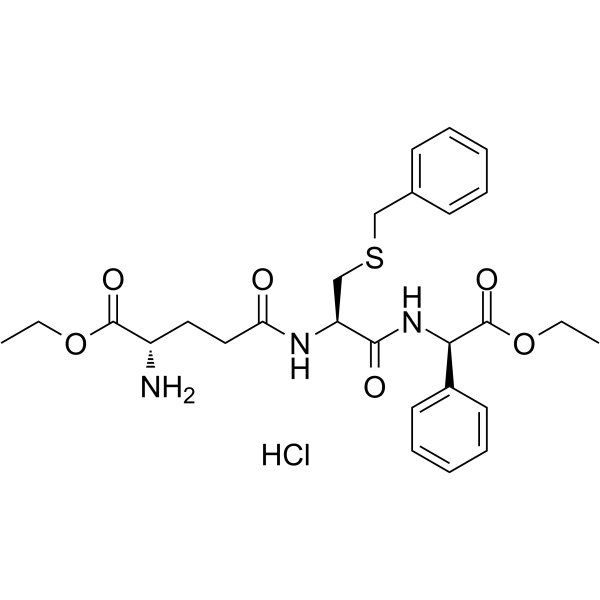
Ezatiostat hydrochloride
CAS No. 286942-97-0
Ezatiostat hydrochloride( TER199 | TLK199 HCl )
Catalog No. M27628 CAS No. 286942-97-0
Ezatiostat hydrochloride is an effective inhibitor of glutathione S-transferase. Ezatiostat hydrochloride is a novel glutathione analog and the potential treatment of cytopenias.
Purity : >98% (HPLC)
 COA
COA
 Datasheet
Datasheet
 HNMR
HNMR
 HPLC
HPLC
 MSDS
MSDS
 Handing Instructions
Handing Instructions
| Size | Price / USD | Stock | Quantity |
| 2MG | 48 | Get Quote |


|
| 5MG | 68 | Get Quote |


|
| 10MG | 111 | Get Quote |


|
| 25MG | 190 | Get Quote |


|
| 50MG | 291 | Get Quote |


|
| 100MG | 491 | Get Quote |


|
| 200MG | 735 | Get Quote |


|
| 500MG | 1104 | Get Quote |


|
| 1G | Get Quote | Get Quote |


|
Biological Information
-
Product NameEzatiostat hydrochloride
-
NoteResearch use only, not for human use.
-
Brief DescriptionEzatiostat hydrochloride is an effective inhibitor of glutathione S-transferase. Ezatiostat hydrochloride is a novel glutathione analog and the potential treatment of cytopenias.
-
DescriptionEzatiostat hydrochloride is an effective inhibitor of glutathione S-transferase. Ezatiostat hydrochloride is a novel glutathione analog and the potential treatment of cytopenias. In addition, Ezatiostat hydrochloride has been revealed to selectively bind to and thus inhibit GSTP1-1.(In Vitro):Because GST P1-1 can bind to and inhibit JNK, Ezatiostat hydrochloride has also been exhibited to inhibit GST P1-1, activate JNK, and promote the growth and maturation of hematopoietic progenitors in preclinical models. Moreover, Ezatiostat hydrochloride has been reported to stimulate the proliferation of myeloid precursors. Ezatiostat hydrochloride has been elucidated to induce growth inhibition and cellular apoptosis in human leukemia cells (CC50: 6-17μM). Apart from these, Ezatiostat hydrochloride has shown the stimulation of multilineage differentiation in mature monocytes, granulocytes, and erythrocytes .(In Vivo):Administration of Ezatiostat stimulates both lymphocyte production and bone marrow progenitor proliferation only in glutathione S-transferase P1-1 (GSTP1+/+) and not in GSTP1-/- animals.
-
In VitroEzatiostat causes dissociation of the enzyme from the jun-N-terminal kinase/c-Jun (JNK/JUN) complex, leading to JNK activation by phosphorylation. The therapeutic action of ezatiostat appears to include both proliferation of normal myeloid progenitors as well as apoptosis of the malignant clone.Selection of a resistant clone of an HL60 tumor cell line through chronic exposure to Ezatiostat (TLK199) results in cells with elevated activities of c-Jun NH2 terminal kinase (JNK1) and ERK1/ERK2, and allowes the cells to proliferate under stress conditions that induced high levels of apoptosis in the wild type cells.
-
In VivoAdministration of Ezatiostat (TLK199), stimulates both lymphocyte production and bone marrow progenitor (colony-forming unit-granulocyte macrophage) proliferation, but only in glutathione S-transferase P1-1 (GSTP1+/+) and not in GSTP1-/- animals.
-
SynonymsTER199 | TLK199 HCl
-
PathwayOthers
-
TargetOther Targets
-
Recptor——
-
Research Area——
-
Indication——
Chemical Information
-
CAS Number286942-97-0
-
Formula Weight566.11
-
Molecular FormulaC27H36ClN3O6S
-
Purity>98% (HPLC)
-
Solubility——
-
SMILESCl.CCOC(=O)C(N)CCC(=O)NC(CSCc1ccccc1)C(=O)NC(C(=O)OCC)c1ccccc1
-
Chemical Name——
Shipping & Storage Information
-
Storage(-20℃)
-
ShippingWith Ice Pack
-
Stability≥ 2 years
Reference
1.Wang Z , Huang J , Zhou S , et al. Anemonin attenuates osteoarthritis progression through inhibiting the activation of IL-1β/NF-κB pathway[J]. Journal of Cellular and Molecular Medicine, 2017.
molnova catalog



related products
-
Quercetagetin 3-meth...
The herbs of Tagetes erecta.
-
Guvacine hydrochlori...
Guvacine hydrochloride is an?inhibits of GABA uptake (IC50 : 10 μM).
-
Risuteganib hydrochl...
Risuteganib hydrochloride is an anti-integrin that downregulates oxidative stress and restores homeostasis, and targets three integrin receptors that are implicated in dry age-related macular degeneration (AMD) in order to restore homeostasis in the retina.



 Cart
Cart
 sales@molnova.com
sales@molnova.com


